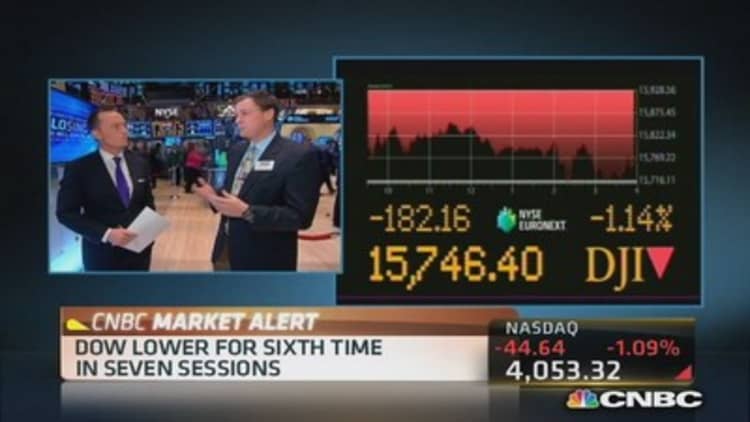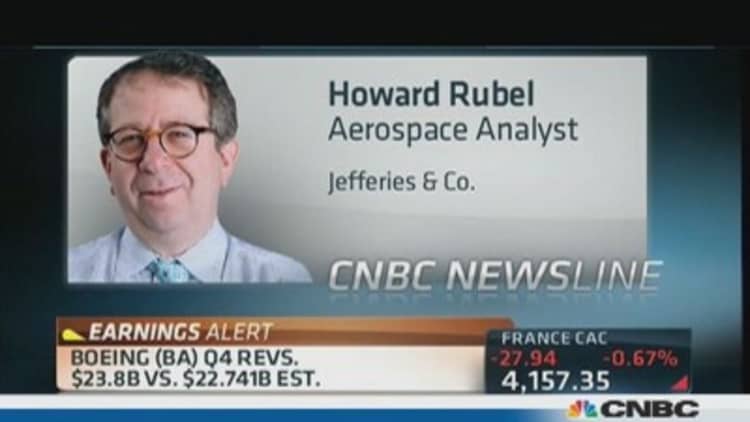
U.S. stocks finished steeply lower on Wednesday, wiping out the prior day's gains and more, as the Federal Reserve opted to stick with its plan to continue to reduce its monthly bond purchases, now down to $65 billion, regardless of recent distress in emerging markets.
"Today's Fed decision to continue with tapering, despite the unfolding turmoil in emerging markets, suggests the Fed has a domestic policy compass firmly in hand. The Fed is sending a clear message that unless a much larger scale crisis emerges, do not expect the Fed to deviate from its current policy path," wrote Jonathan Lewis, chief investment officer at Samson Capital Advisors.
"We would not be surprised to see the Fed increase its tapering to $15 billion or 20 billion at one of its summer meetings, and expect the Fed to be done tapering by the fall should the economy continue on its current path," said Jennifer Vail, chief investment officer for institutional and corporate trust at U.S. Bank Wealth Management.
The yield on the 10-year Treasury note fell to a low of 2.68 percent, its first time under 2.7 percent since Nov. 26.
"The Fed's actions continue to send reverberations to the other economies of the world, and not positive ones. The strength of the dollar, via the taper, is exposing some real weakness in other markets and economies. Keep in mind that all of this could change on a dime and go the other way," noted Kevin Giddis, head of fixed income capital markets at Raymond James.
The Fed decision was expected, with several market observers saying policy makers had little choice.
"If they had paused, they risked sending a signal to markets that they lacked conviction, were slaves to market rather than economic forces and/or were far more worried than the average investor, the latter of which could have caused a fair bit of panic among risk assets. So they did as was expected," emailed Dan Greenhaus, chief market strategist at BTIG.
"The Fed would lose a lot of credibility if they blink over emerging markets. They have to act cool and collected by sticking to their plan of focusing on the U.S. economy. Looking ahead, it makes Janet Yellen's March press conference more interesting," said Peter Boockvar, chief market analyst at the Lindsey Group, of the next Fed chairman.
Major U.S. Indexes
The Dow Jones Industrial Average fell as much as 219 points, and ended down 189.77 points, or 1.2 percent, at 15,738.79.
The lost 18.30 points, or 1 percent, to 1,774.20, with consumer staples falling hardest and materials faring best among its 10 major sectors.
The Nasdaq declined 46.53 points, or 1.1 percent, to 4,051.43.
The CBOE Volatility Index (VIX), a measure of investor uncertainty, rose nearly 12 percent to 17.66.
More every stock that rose, more than three fell on the New York Stock Exchange, where 736 million shares traded. Composite volume neared 4 billion.

The dollar was steady against the currencies of major U.S. trading partners.
Gold futures climbed $11.40, or 0.9 percent, to $1,262.20 an ounce and crude-oil futures declined 5 cents to $97.36 a barrel.
AT&T and Boeing both fell after issuing disappointing full-year forecasts. Yahoo slid as its online ad prices
"Earnings so far have been nothing to write home about, and it seems that no matter what, the market has found something imperfect even in the best of earnings," said JJ Kinahan, chief strategist at TD Ameritrade.
By mid-day, stock indexes had recouped about half of the losses that came on increasing worries about central bank and currency moves in emerging markets. "I think investors are getting comfortable with the idea that Turkey and Argentina are unlikely to change the outlook for U.S. stocks," said Greenhaus.
Ahead of Wednesday's open, stock-index futures had rallied along with Turkish equities and Turkey's currency after Turkey hiked its interest rates, but all reversed course, with the Turkish lira weakening regardless of its central bank's rate hike.
"It's picking your poison, at least in Turkey; it's the right Volcker-type move in the long term, but in the short term it can do a lot of damage to economic growth," said Boockvar of the Turkish action, which was followed by an unexpected increase in its benchmark rate by the South Africa Reserve Bank. "Right now central banks are in a no-win situation," Boockvar added.
On Tuesday, stocks rallied, with the Dow rebounding after a five-session rout, as investors embraced better-than-expected quarterly earnings from companies including D.R. Horton and Pfizer.
—By CNBC's Kate Gibson
Coming Up This Week:
Thursday: Initial jobless claims at 8:30 a.m. Eastern, Real fourth-quarter GDP at 8:30 a.m. Eastern. Pending home sales at 10 a.m. Eastern. Earnings from Google, Exxon Mobil, Amazon.com, Chipotle, ConocoPhillips, Celgene, Eli Lilly, 3M, UPS, Royal Dutch Shell, Diageo, Occidental Petroleum, Colgate-Palmolive, Harley-Davidson, Northrop Grumman, LVMH, Time Warner Cable, Altria, PulteGroup, Raytheon, Ericsson, Blackstone, Viacom, Whirlpool, Under Armour, Cardinal Health, Visa, Potash, Tenneco, Sherwin-Williams, Autonation and Beazer Homes.
Friday: Personal income at 8:30 a.m. Eastern. Consumer sentiment at 9:55 a.m. Eastern. Housing vacancies at at 10 a.m. Eastern. Earnings from Chevron, Honda, MasterCard, Autoliv, Brookfield Office Properties, Dominion, Mattel, National Oilwell, Tyson Foods, Weyerhaeuser, Booz Allen Hamilton, Lear Legg Mason, Tyco, Mead Johnson, Aon and Paccar.
More From CNBC.com:


